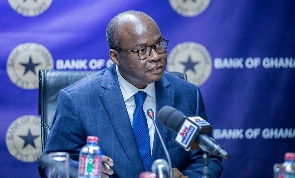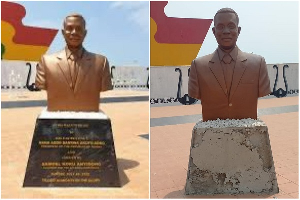In a strategic move to safeguard the economy’s stability, the Bank of Ghana (BoG) stepped in as a loss absorber during the recent domestic debt exchange programme (DDEP), absorbing substantial impairment losses.
This proactive measure ensured the country’s qualification for the IMF programme, even as it faced challenges stemming from the quantitative easing programme during the peak of COVID-19 pandemic and interest rate changes. However, concerns remain as the central bank strategises to restore its balance sheet and reinforce credibility while maintaining its commitment to policy solvency.
Serving as a safety net during the DDEP, the Bank of Ghana tactically absorbed major haircut losses on both marketable and non-marketable government debt instruments, as well as exposure to COCOBOD. This measure was instrumental in enabling government to meet the IMF programme threshold. However, the BoG’s role came at a cost as it experienced a significant loss of GH¢60.8billion in 2022.
The central bank’s non-marketable holdings of government debt instruments faced a 50 percent principal haircut, leading to a substantial impairment loss of GH¢32.3billion. Impairments on marketable instruments further contributed to this, accounting for an additional GH¢16.1billion. These combined impairments brought the total losses from government holdings to GH¢48.4billion.
External factors like price fluctuations and exchange rate movements incurred a loss of GH¢5.2billion, while COCOBOD loan impairments amounted to GH¢4.7billion.
Consequently, BoG had new instruments with extended tenor and significantly reduced coupons.
“Whereas all other stakeholders that participated in the DDEP did not have principal haircuts, but rather had new instruments with new tenors and coupon structure, the BoG served as a loss absorber to the entire debt exchange programme – a key requirement that allowed the government of Ghana to meet the threshold for approval of the IMF programme,” the BoG said in a statement addressing public concern on its losses in 2022.
As part of the IMF programme, the domestic debt exchange aimed to reduce government debt from 105 percent to 55 percent of GDP by 2028. Although debt holders received new instruments with extended tenors and lower interest, the 55 percent threshold was not reached. To meet the IMF requirements, the Bank of Ghana intervened to bridge the gap.
The central bank explained that this predicament stemmed from the country’s fiscal landscape since 2019, marked by a growing mismatch between revenue inflows and expenditures. The year 2020 witnessed a reliance on exceptional support from the IMF, World Bank resources, and issuance of a GH¢10billion COVID-19 bond by the BoG.
This imbalance led to widening sovereign spreads on bonds, reflecting investor dissatisfaction with fiscal policy. The subsequent expansionary budget in 2022 by about 23 percent with a raft of revenue measures to raise financing – coupled with credit rating downgrades – triggered a liquidity crisis that escalated into a balance of payments crunch.
As the domestic auction faltered, the Bank of Ghana intervened to prevent a severe economic and social crisis. Rapidly losing reserves and accumulating an overdraft of US$500million with government within two months, the BoG’s intervention was crucial. The situation prompted government to approach the IMF for support in July 2022 – leading to the establishment of a comprehensive reform programme, including debt restructuring.
Maintaining policy solvency
Addressing concerns over the central bank’s solvency, the BoG underscored its commitment to prudent management, governance and transparent accounting practices. It highlighted that unlike commercial banks, central banks cannot be insolvent or bankrupt.
While the negative outcome of the 2022 financials affected the bank’s equity, it assured stakeholders that its policy solvency remained intact.
The BoG emphasised its dedication to maintaining inflation control and financial stability as core mandates. It revealed plans to gradually restore positive equity over the next five years, with potential government recapitalisation identified as part of the strategy. External auditors and the IMF endorsed these measures to sustain the BoG’s policy solvency, thus upholding its credibility.
Looking ahead, the central bank’s focus remains on navigating challenges posed by the DDEP while fostering economic resilience. Despite the negative equity stemming from the exchange programme, the Bank of Ghana stands as a non-profit public policy institution committed to fulfilling its mandate. The loss absorption role, while causing financial strain, was essential for ensuring Ghana’s eligibility for the IMF programme.
As the BoG works diligently to restore positive equity and enhance its financial standing, the strategic actions taken during the DDEP reflect a commitment to safeguarding the country’s economic stability. The central bank’s proactive stance in the face of adversity demonstrates its dedication to maintaining its policy solvency and fostering financial credibility.
In conclusion, the Bank of Ghana’s role as a loss absorber during the domestic debt exchange programme showcased its commitment to economic stability. By absorbing substantial impairment losses, the BoG ensured Ghana’s qualification for the IMF programme and its strategic efforts to manage the pandemic-induced challenges. While facing immediate financial setbacks, the central bank says it remains resolute in gradually restoring positive equity and upholding its policy solvency to bolster economic confidence.3
Business News of Friday, 11 August 2023
Source: thebftonline.com

















